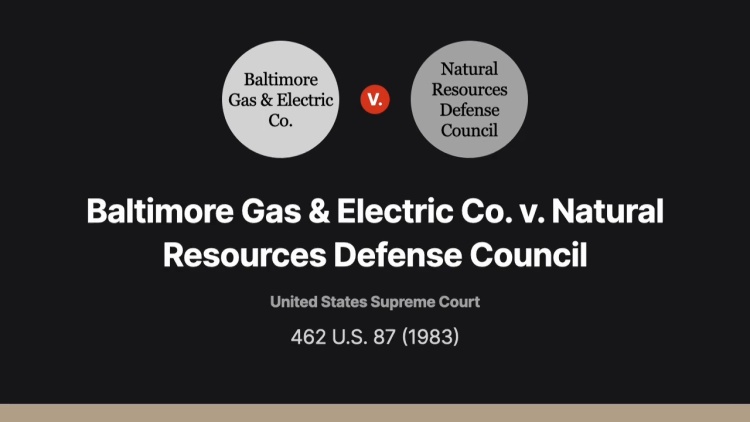Baltimore Gas & Electric Co. v. Natural Resources Defense Council
United States Supreme Court
462 U.S. 87 (1983)

- Written by Sean Carroll, JD
Facts
The National Environmental Protection Act (NEPA) directed federal agencies to consider environmental impacts before taking any major action. The Nuclear Regulatory Commission (defendant) determined as part of a rulemaking that nuclear licensing boards should assume as part of their NEPA review that nuclear-waste storage facilities did not leak and thus had no environmental impact. The commission inserted this assumption into a numerical table estimating the environmental impact of fuel-cycle activities of a light-water nuclear reactor over a period of one year. Licensing boards then used the table when acting on license applications. Although noting that there were uncertainties accompanying the assumption, the commission determined that the probability of leakage was so low that the issue need not be reconsidered in each and every license application. Further, the commission counterbalanced the assumption with higher estimates of environmental impacts elsewhere in the table. The commission concluded that despite the no-leakage assumption, the table’s overall environmental impact estimate erred on the side of caution. The rule implementing the no-leakage assumption also provided that the table should be supplemented in each license proceeding with narrative evidence about fuel-cycle activities’ health, socioeconomic, and cumulative impacts. The Natural Resources Defense Council (NRDC) (plaintiff) challenged the rule in the United States Court of Appeals for the D.C. Circuit. The court of appeals stated that an agency can make generic findings under NEPA and insert them into individual licensing determinations. However, the court of appeals found the commission’s no-leakage assumption arbitrary and capricious and vacated the rule. The United States Supreme Court granted certiorari.
Rule of Law
Issue
Holding and Reasoning (O’Connor, J.)
What to do next…
Here's why 907,000 law students have relied on our case briefs:
- Written by law professors and practitioners, not other law students. 47,100 briefs, keyed to 996 casebooks. Top-notch customer support.
- The right amount of information, includes the facts, issues, rule of law, holding and reasoning, and any concurrences and dissents.
- Access in your classes, works on your mobile and tablet. Massive library of related video lessons and high quality multiple-choice questions.
- Easy to use, uniform format for every case brief. Written in plain English, not in legalese. Our briefs summarize and simplify; they don’t just repeat the court’s language.





